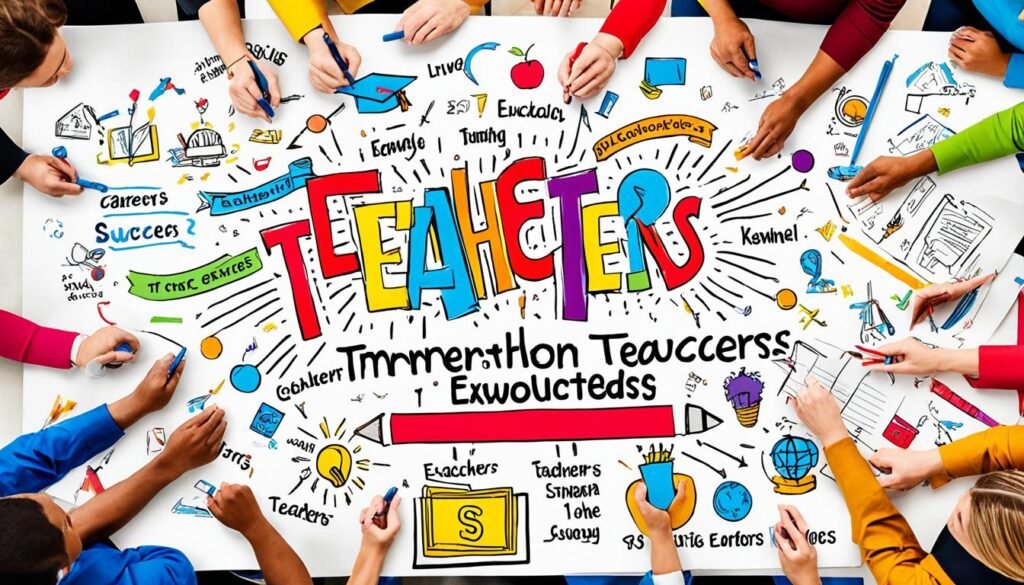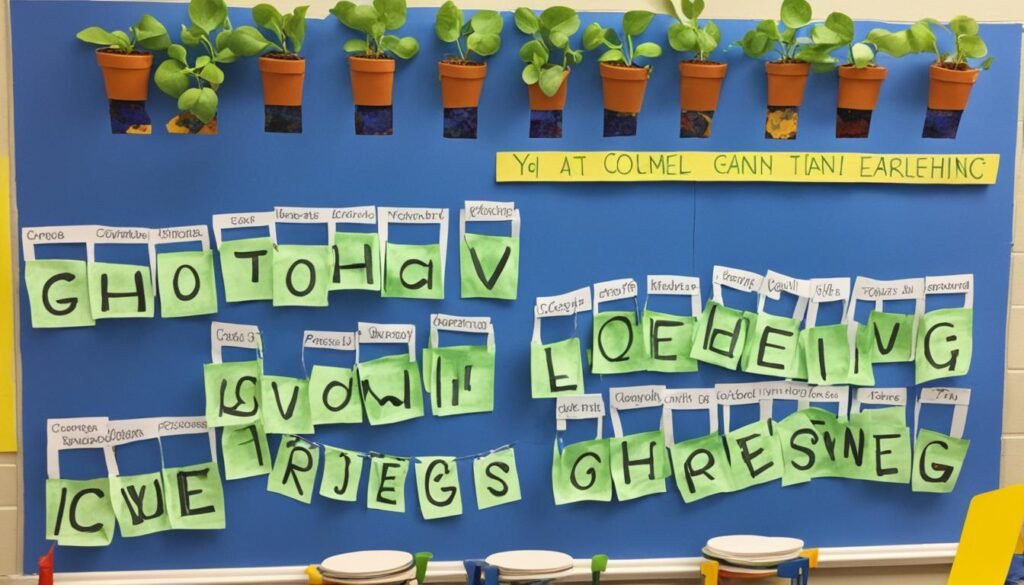Educators play a vital role in shaping the future of students through their dedication and commitment to education careers. As mentors and guides, educators inspire students to achieve their goals and create a positive impact on society. Their passion for teaching and unwavering support empowers students to thrive and succeed.
Also Read: Digital Academia: Navigating The World Of Online Courses
Key Takeaways: Education Careers
- Education careers are instrumental in shaping student futures.
- Educators serve as mentors and guides, inspiring students to achieve their goals.
- Educators play a crucial role in fostering a positive impact on society.
- Passion and dedication are essential qualities for a career in education.
- Success as an educator hinges on an unwavering commitment to student achievement.
Also Read: Opportunities Unlimited: The Reach Of Education Scholarships
The Importance of Teaching as a Profession
Teaching is more than just a career; it is a vocation fueled by a deep passion for imparting knowledge and shaping young minds. Educators are driven by a commitment to student success and an unwavering dedication to their craft. The impact they have on the lives of their students and society as a whole is immeasurable.
Also Read: Tradition And Transformation: A Portrait Of Stanford University
Teachers find immense joy and fulfillment in witnessing their students grow, succeed, and become active contributors to their communities. They have the unique privilege of shaping the future generation, equipping them with the skills, knowledge, and values necessary for a meaningful and successful life.
Teaching is not just about delivering lessons; it is about igniting a lifelong passion for learning, inspiring critical thinking, and fostering a love for exploration and discovery.
The path of an educator can be emotionally challenging, as teachers face various obstacles and setbacks along the way. However, the rewards far outweigh the difficulties. The gratification that comes from witnessing a student’s “aha” moment, the growth they observe, and the positive impact they make on young lives are unparalleled.
Teaching is a noble profession that requires unwavering commitment, dedication, and a genuine desire to make a difference. It takes resilience, adaptability, and a lifelong commitment to learning and professional growth. Teachers continuously strive to enhance their pedagogical skills to meet the evolving needs of their students.
The Impact of Educators
Educators lay the foundation for the success and advancement of individuals and society. They not only impart academic knowledge but also serve as mentors, role models, and sources of guidance and inspiration. Teachers instill values, foster personal growth, and empower students to become independent thinkers and lifelong learners.
Also Read: How Can I Find The Best Online Courses For My Career Goals?
Their unwavering commitment to student success goes beyond the classroom, extending to the overall well-being and holistic development of their students. By nurturing a safe and inclusive learning environment, teachers create spaces where students can thrive, explore their passions, and build their confidence.
Educators embody the values they teach, demonstrating passion, dedication, and a commitment to continually improving themselves. Through their actions and words, they inspire students to strive for excellence and reach their full potential.
The Rewards of a Career in Education
A career in education offers immense personal and professional fulfillment. Teachers have the opportunity to make a lasting impact on the lives of their students and contribute to positive social change. Their work is both challenging and rewarding, as they witness the transformative power of education every day.
Also Read: Is Online Education The Future Of Learning?
By choosing a career in education, individuals can pursue their passion for teaching and inspire future generations. They become agents of change, shaping student futures and unlocking the potential within each child. The energy, enthusiasm, and eagerness to learn that students bring to the classroom fuel the teachers’ own love for learning.
The Role of Teachers as Mentors and Motivators

Teachers play a crucial role in the lives of their students, serving as mentors and motivators who provide guidance, support, and encouragement. They go beyond imparting knowledge and act as role models, shaping students into well-rounded individuals.
As mentors, teachers offer valuable guidance to their students. Whether it’s helping them navigate academic challenges or providing personal support, teachers are there to lend a helping hand. Their experience and expertise allow them to offer practical advice and solutions to help students overcome obstacles and achieve their goals.
“A good teacher can inspire hope, ignite the imagination, and instill a love of learning.”
– Brad Henry
Teachers also serve as motivators, inspiring their students to reach their full potential. They create a supportive and encouraging learning environment that fosters enthusiasm and a desire for success. Through their words and actions, teachers instill confidence and a belief in their students, empowering them to take on challenges and strive for greatness.
Furthermore, teachers act as role models for their students. They exemplify the values and characteristics they hope to instill in their students, such as perseverance, empathy, and resilience. By setting a positive example, teachers help shape the character and moral compass of their students, preparing them for a successful future.
Mentors and Guidance
One of the essential aspects of a teacher’s role as a mentor is providing guidance to students. Whether it’s helping them navigate course selections, supporting them in exploring their career interests, or offering advice on personal matters, teachers are there to provide the necessary guidance every step of the way.
Through their guidance, teachers help students make informed decisions about their academic paths and future careers. They assist students in identifying their strengths, interests, and passions, guiding them towards opportunities that align with their aspirations. By understanding each student’s unique talents and goals, teachers can tailor their guidance to ensure students receive the support and direction they need.
Support and Encouragement
In addition to guidance, teachers also provide crucial support and encouragement to their students. They create a nurturing and safe environment where students feel comfortable seeking advice and assistance. Teachers listen attentively to their students’ concerns and challenges, offering words of encouragement and motivating them to overcome obstacles.
Teachers understand the importance of celebrating their students’ achievements, no matter how big or small. By recognizing and acknowledging their students’ efforts, teachers boost their confidence and self-esteem, further motivating them to continue striving for success.
Inspiring Students to Reach Their Full Potential
Teachers play a fundamental role in motivating students to reach their full potential. Through their dedication, passion, and unwavering belief in their students’ abilities, teachers inspire them to aim higher and achieve their goals.
By providing both academic and emotional support, teachers create an environment where students feel valued and empowered. They foster a love for learning and encourage students to think critically, explore new ideas, and challenge themselves intellectually. Through their mentorship and motivation, teachers unlock the potential within each student, helping them develop the skills and confidence needed to succeed in their academic and personal lives.
Teachers’ Impact on Academic Excellence

Teachers play a crucial role in fostering academic excellence in students. Their dedication and passion for imparting knowledge create a stimulating learning environment where students can thrive. By utilizing innovative teaching methods and designing a comprehensive curriculum, teachers inspire a love for learning and stimulate critical thinking and curiosity.
Through their expertise and guidance, teachers instill a commitment to academic excellence in their students. They encourage students to reach their full potential by nurturing their strengths and supporting them in overcoming challenges. Teachers not only transmit information but also inspire a deep passion for learning that extends beyond the classroom.
“Education is not the filling of a pail, but the lighting of a fire.” – William Butler Yeats
William Butler Yeats’ quote encapsulates the essence of teachers’ impact on academic excellence. They do not merely impart knowledge but ignite a lifelong thirst for learning. Teachers create a nurturing environment where students feel encouraged to explore, question, and seek knowledge independently.
Furthermore, teachers play a crucial role in developing critical thinking skills in their students. Through thought-provoking discussions, problem-solving exercises, and open-ended assignments, teachers challenge students to analyze information, evaluate evidence, and think critically. By fostering this skill, teachers equip students with the ability to make well-informed decisions, approach challenges creatively, and thrive in a rapidly changing world.
Teachers also facilitate collaborative learning experiences, encouraging students to work together, exchange ideas, and seek diverse perspectives. This not only enhances their academic growth but also cultivates teamwork and interpersonal skills that are essential for success in both academic and professional settings.
Benefits of Teachers’ Impact on Academic Excellence:
- Enhanced student engagement and motivation
- Development of critical thinking and problem-solving skills
- Cultivation of a love for learning
- Improved academic outcomes and performance
- Nurturing of independent and lifelong learners
In summary, teachers play a crucial role in fostering academic excellence by creating an engaging learning environment, stimulating critical thinking, and nurturing a love for learning. Their impact extends far beyond the classroom, shaping students into lifelong learners equipped with the skills and knowledge they need to succeed in the future.
Teachers’ Role in Personal Development

Teachers play a pivotal role in the personal development of students. They are not just educators but mentors, guides, and supporters who help students discover their strengths, weaknesses, and interests. Through their guidance and expertise, teachers empower students to make informed decisions about their academic and career paths.
One of the key aspects of personal development that teachers focus on is helping students identify their strengths. By recognizing and nurturing these strengths, teachers enable students to build confidence and excel in areas where they naturally excel. This process of self-discovery and personal growth lays a strong foundation for future success.
Similarly, teachers also assist students in recognizing their weaknesses. By addressing weaknesses and providing support, teachers help students overcome challenges and develop essential skills. Whether it’s through tailored instruction, extra assistance, or targeted feedback, teachers play a crucial role in helping students turn their weaknesses into strengths.
Career guidance is another crucial component of personal development facilitated by teachers. They assist students in understanding their career options, exploring different fields, and making informed decisions about their future. Through counseling sessions and discussions, teachers help students align their interests and aspirations with viable career paths, setting them up for a fulfilling and successful professional journey.
The counseling team in schools provides vital support in this aspect, offering resources, assessments, and personalized guidance. With their expertise in career exploration and planning, the counseling team helps students make well-informed decisions, ensuring that they are on the right track towards achieving their academic and career goals.
“Teachers play a crucial role in helping students discover their strengths, address their weaknesses, and make informed decisions about their academic and career paths.”
Through their dedication, mentorship, and commitment to personal development, teachers shape not only the academic success of their students but also their overall growth as individuals. By guiding them to recognize their strengths, address their weaknesses, and make informed career choices, teachers empower students to navigate the path of self-discovery and set themselves up for a future filled with potential and possibilities.
Teachers’ Influence on Character Building

Teachers have a profound impact on the moral and ethical development of students. Through values education, they play a crucial role in shaping the character and personality of individuals. By teaching concepts such as honesty, kindness, and responsibility, teachers instill essential values in students that are the foundation for a successful and fulfilling life.
Values education goes beyond academic subjects, focusing on the development of students’ character. Teachers create a nurturing and supportive environment where students can not only learn academic content but also understand the importance of moral and ethical principles in their daily lives. By emphasizing the significance of character building, teachers help students become compassionate, empathetic, and responsible members of society.
“Education is the most powerful weapon which you can use to change the world.” – Nelson Mandela
In the journey of character building, teachers serve as role models, demonstrating the values they teach through their own actions and behaviors. Students learn by observing and imitating the behavior of their teachers, making it vital for educators to embody the values they want their students to cultivate.
Character building occurs not only in formal lessons but also through everyday interactions between teachers and students. By offering guidance, support, and constructive feedback, teachers help students develop self-awareness and reflection, enabling them to make decisions based on moral and ethical principles.
Values education and character building are not limited to classrooms; they extend to extracurricular activities and community engagement. Teachers create opportunities for students to apply their values in real-life situations, reinforcing the importance of moral and ethical behavior in different contexts.
Benefits of Character Building in Education:
- Develops empathy and compassion towards others
- Fosters respect for diversity and inclusion
- Encourages responsible decision-making
- Promotes positive relationships and effective communication
- Cultivates a sense of integrity and honesty
Character building is not a one-time lesson but an ongoing process. Teachers continually reinforce values education throughout students’ educational journey, helping them navigate challenges and make choices aligned with their moral compass.
Through their influence on character building, teachers contribute to creating a better society where individuals think critically, act ethically, and contribute positively to their communities. The impact of values education extends far beyond academic achievements, shaping students into individuals who lead with integrity, compassion, and a strong sense of moral responsibility.
| Character Building | Values Education | Moral and Ethical Development |
|---|---|---|
| Develops empathy and compassion towards others | Teaches concepts of honesty, kindness, and responsibility | Instills a sense of integrity and moral values |
| Fosters respect for diversity and inclusion | Emphasizes the significance of moral and ethical principles | Cultivates a strong moral compass |
| Encourages responsible decision-making | Creates opportunities for applying values in real-life situations | Guides students to make choices aligned with ethical standards |
| Promotes positive relationships and effective communication | Encourages practicing values in everyday interactions | Nurtures empathy and collaboration |
Boosting Students’ Confidence

Teachers play a crucial role in boosting students’ self-confidence through the power of positive feedback and constructive criticism. By providing encouragement and support, educators help students develop a strong belief in their abilities, which becomes a valuable asset they carry with them throughout their lives.
Positive feedback serves as a confidence booster by acknowledging students’ efforts and accomplishments. When teachers recognize and celebrate students’ achievements, it motivates them to persevere, take risks, and believe in their potential. A simple word of praise or recognition can go a long way in building students’ confidence and self-esteem.
“Words of encouragement have the power to ignite a fire within someone, driving them to surpass their own expectations.” – Jane Smith, Educator
Constructive criticism, when delivered effectively, can also contribute to students’ confidence development. By providing specific feedback on areas that need improvement, teachers guide students towards growth and progress. It shows students that their teachers believe in their potential to grow and develop, encouraging them to embrace challenges and strive for excellence.
Constructive criticism can be in the form of suggestions for improvement, highlighting areas where students can focus and develop their skills. When teachers provide actionable steps and guidance, students feel empowered to take ownership of their learning journey, fostering a growth mindset and boosting their confidence along the way.
It is essential for educators to strike a balance between positive feedback and constructive criticism, creating a supportive and nurturing environment where students feel safe to take risks, make mistakes, and learn from them. This balance ensures that students receive the guidance they need to grow while feeling valued and confident in their abilities.
Confidence Boosters in the Classroom:
- Encouraging student participation and active engagement
- Setting achievable goals and celebrating progress
- Providing opportunities for students to showcase their strengths and talents
- Offering praise and recognition for effort and improvement
- Celebrating mistakes as opportunities for growth and learning
| Benefits of Confidence Boosters | Examples |
|---|---|
| Increased motivation and engagement | Students actively participate in class discussions and activities, eager to learn and contribute. |
| Enhanced risk-taking and resilience | Students are willing to step out of their comfort zones, embrace challenges, and bounce back from setbacks. |
| Improved self-esteem and well-being | Students develop a positive self-image, recognizing their worth and value as individuals. |
| Stronger sense of empowerment and belief in one’s abilities | Students exhibit a greater belief in their capacity to achieve their goals and succeed in their endeavors. |
By incorporating confidence boosters into their teaching practices, educators have the power to transform students’ lives, equipping them with the self-assurance and resilience they need to overcome challenges and thrive.
The Significance of Middle-Level Educators

Middle-level educators, including middle school principals and assistant principals, play a significant role in shaping the future of students during their transformative years. They have the responsibility of guiding students through this phase of growth and development, laying a strong foundation for their academic and personal success.
Middle-level educators are instrumental in shaping school culture and creating an environment conducive to learning and growth. They foster a sense of belonging and promote inclusivity, ensuring that every student feels valued and supported.
These dedicated educators champion innovative learning strategies that empower students to thrive academically. By incorporating technology, collaborative projects, and real-world applications into the curriculum, they inspire a love for learning and prepare students for the challenges of the future.
“Middle-level educators have the power to shape the next generation of leaders, innovators, and changemakers.”
Moreover, middle-level educators prioritize the safety and well-being of their students, creating a safe and robust educational environment. They implement protocols, policies, and initiatives that promote physical and emotional well-being, creating a nurturing space where students can thrive.
By serving as role models, mentorship figures, and advocates for their students, middle-level educators are shaping future generations. They go above and beyond their daily duties to provide guidance, support, and encouragement, helping students develop the skills and resilience necessary to navigate the challenges of life.
The Role of Middle School Principals
Middle school principals play a pivotal role in leading and coordinating the efforts of middle-level educators. They are responsible for setting the educational vision, maintaining high standards, and ensuring effective teaching and learning practices across the school.
Some of the key responsibilities of middle school principals include:
- Creating a positive and inclusive school culture
- Providing instructional leadership and support
- Facilitating professional development opportunities for teachers
- Collaborating with parents and the wider community
- Advocating for the needs of the school and its students
Middle school principals foster a collaborative and supportive work environment, empowering their team of educators to make a lasting impact on students’ lives.
The Impact of Middle-Level Educators
| Benefits of Middle-Level Educators | How Middle-Level Educators Shape the Future |
|---|---|
| Guidance and support for students | Nurturing future leaders and innovators |
| Promotion of innovative learning strategies | Preparing students for the challenges of the future |
| Creating a safe and inclusive educational environment | Fostering a sense of belonging and well-being |
| Role modeling and mentorship | Empowering students to navigate challenges |
The impact of middle-level educators extends far beyond the classroom. By shaping the future, they contribute to the development of a more knowledgeable, compassionate, and successful society.
NAESP’s Recognition of Middle-Level Educators

The National Association of Elementary School Principals (NAESP) understands the incredible value that middle-level educators bring to the education system. To honor their hard work and dedication, NAESP celebrates Middle-Level Education Month, a special observance that shines a spotlight on the vital role played by middle school principals and assistant principals in shaping the lives of young learners.
During Middle-Level Education Month, educators are recognized for their unwavering commitment to providing quality education and fostering a nurturing environment for middle-level students. NAESP appreciates their tireless efforts and encourages educators to continue making a positive impact on the lives of their students.
“Middle-level educators are at the forefront of shaping the future generations of this nation. Their dedication and passion have a profound impact on students’ personal growth, academic success, and overall well-being.” – NAESP President
NAESP offers a range of resources, recognition campaigns, and networking opportunities during Middle-Level Education Month. These initiatives aim to support middle-level educators in their professional growth, encourage collaboration within the education community, and provide a platform for celebrating their achievements.
By coming together, sharing ideas, and learning from one another, middle-level educators can continue to shape and improve the educational landscape. Middle-Level Education Month not only acknowledges their invaluable contributions but also serves as a reminder of the lasting impact they have on the lives of their students.
NAESP’s Initiatives for Middle-Level Educators
- Professional development workshops and conferences focused on middle-level education.
- Recognition programs honoring outstanding middle-level educators.
- Online platforms for educators to connect, collaborate, and share best practices.
- Advocacy efforts to promote the importance of middle-level education and support educators in their roles.
- Research and publications highlighting innovative strategies and approaches for middle-level education.
Through these initiatives, NAESP strives to empower middle-level educators to excel in their profession, inspire their students, and continue making a positive difference in the lives of young learners.
| Benefits for Middle-Level Educators during Middle-Level Education Month | Ways to Celebrate |
|---|---|
| Access to professional development resources and workshops centered on middle-level education | Organize special events or programs to recognize the achievements of middle-level educators |
| Opportunities for networking and collaboration with fellow educators | Share success stories and innovative teaching practices on social media using hashtags like #MiddleLevelEducationMonth |
| Recognition for outstanding contributions to middle-level education | Collaborate with local businesses and organizations to provide discounts or incentives for middle-level educators |
| Access to research and publications on effective strategies for middle-level education | Invite guest speakers or create mentorship programs to inspire students and educators alike |
Through its commitment to middle-level educators, NAESP aims to create a supportive and enriching environment where they can thrive and continue making a profound impact on the lives of their students. Middle-Level Education Month is a time to celebrate these educators and recognize their invaluable contributions to the field of education.
Importance of Middle-Level Educators

Middle-level educators play a pivotal role in shaping the growth and development of students during a critical phase of their education. These dedicated individuals wear many hats, leveraging their leadership skills at the middle level to guide students through transformational years filled with challenges and immense growth.
One of the key responsibilities of middle-level educators is building relationships with parents. By fostering open lines of communication and collaboration, these educators ensure that parents actively participate in their child’s educational journey. This partnership between educators and parents creates a strong support system that positively impacts students’ academic achievement and social-emotional well-being.
“Middle-level educators have the unique opportunity to create an environment where students can discover their passions, unlock their potential, and lay a strong foundation for their future.”
Collaboration among teachers is another crucial aspect of middle-level education. These educators work collectively to develop and implement innovative teaching strategies that cater to the diverse needs and learning styles of their students. By sharing best practices and supporting one another, middle-level educators foster a culture of continuous improvement that benefits both students and the teaching community as a whole.
In the middle-level education environment, dedicated educators create an inclusive space where students are encouraged to explore their interests and talents. By promoting student agency and providing opportunities for self-discovery, these educators empower students to take ownership of their learning journey. This approach helps shape students’ growth and development by nurturing their individual strengths and interests.
Leadership at the Middle Level
At the middle level, educators serve as mentors, role models, and guides for their students. They exemplify the qualities of effective leaders by fostering a positive and supportive classroom culture. Through their leadership, middle-level educators instill important values such as resilience, empathy, and integrity in their students, preparing them to become responsible and ethical individuals in society.
Furthermore, middle-level educators play a critical role in equipping students with the necessary skills for future success. They prioritize the development of essential competencies such as critical thinking, problem-solving, and collaboration. By providing opportunities for students to apply these skills in real-life contexts, middle-level educators prepare them to thrive in higher education, the workforce, and beyond.
“Middle-level educators shape students’ growth and development, not just academically, but also socially and emotionally. They guide students as they navigate the complexities of relationships, self-identity, and personal responsibility.”
Overall, the importance of middle-level educators cannot be overstated. Their leadership, dedication, and commitment to shaping students’ growth and development set a solid foundation for their future endeavors. By nurturing a love for learning, fostering collaboration, and cultivating a supportive environment, these educators make a profound impact on the lives of their students, shaping them into confident, well-rounded individuals ready to contribute positively to society.
Fostering a Connection Between Teachers and Students

The connection between teachers and students is a vital component in inspiring future generations, shaping their values, and nurturing their potential. Teachers serve as mentors and role models, playing a pivotal role in guiding students towards success. Through mentorship and guidance, teachers develop a profound teacher-student bond, creating a nurturing environment where students feel valued and motivated to excel.
Teachers’ mentorship goes beyond academic guidance; it extends to personal development, character building, and career aspirations. By providing support and encouragement, teachers empower students to overcome challenges and embrace their unique strengths. The mentorship relationship fosters a sense of trust and reliability, which inspires students to believe in themselves and their abilities.
“Teachers have the power to unlock the potential within each student. Through their guidance and mentorship, they instill the confidence necessary for students to embrace their talents and pursue their dreams.” – Dr. Maya Johnson, Principal at Roosevelt High School
The teacher-student bond is built on trust, respect, and empathy. It empowers teachers to understand the individual needs of their students and tailor their approach accordingly. This personal connection creates a safe space for students to express themselves, ask questions, and seek advice. Such an environment encourages open communication, fostering a strong support system for the students’ academic and personal growth.
Mentorship facilitates a two-way learning experience, where teachers impart knowledge while also learning from their students. By genuinely engaging with their students, teachers discover fresh perspectives, innovative ideas, and a deeper understanding of the issues faced by the younger generation. This reciprocal relationship nurtures mutual respect and strengthens the bond between teachers and students.
Teachers who prioritize mentorship and connection not only have a lasting impact on the lives of individual students but also inspire future generations. Through their dedication and commitment, they create a ripple effect that elevates entire communities. The teacher-student bond is a catalyst for growth, empowering students to become confident, compassionate, and driven individuals who are motivated to make a difference in the world.
Real-Life Mentorship Success Story
Anna Collins, a high school student, credits her teacher, Mr. Patel, for igniting her passion for chemistry. Mr. Patel recognized Anna’s natural curiosity and supported her in pursuing advanced chemistry courses and participating in national science fairs. Under his mentorship, Anna developed essential lab skills, critical thinking abilities, and a deep appreciation for the subject.
Mr. Patel’s guidance not only inspired Anna to pursue a degree in chemical engineering but also nurtured her leadership skills and commitment to giving back to her community. Today, Anna works as a mentor for aspiring chemistry students, passing on the same passion for learning and mentorship that Mr. Patel instilled in her.
Benefits of Teacher-Student Mentorship
| Benefits | Description |
|---|---|
| Enhanced Academic Performance | Mentorship improves students’ understanding of the subject matter and boosts their motivation to excel academically. |
| Personal Development | Teachers guide students in discovering their strengths, weaknesses, and areas for personal growth. |
| Character Building | Mentorship instills values, ethics, and principles, shaping students into responsible and compassionate individuals. |
| Career Guidance | Teachers provide insights into different career paths, offer advice, and help students make informed decisions about their future. |
| Confidence Boost | Mentorship builds students’ self-confidence, empowering them to take risks, pursue challenges, and achieve their goals. |
A career in education offers a diverse range of opportunities for professionals looking to make a difference in the lives of students. Whether specializing in special education, pursuing a degree in education, or embarking on an education career path, individuals can expect varying salaries and job prospects. Education teachers, including those in early childhood education, play a crucial role in helping students develop both inside and outside the classroom, often requiring certification and advanced degrees. Principals and administrators in the field of education oversee curriculum development, instructional planning, and classroom management, with median annual salaries reflecting their responsibilities. Teaching careers encompass various grade levels, specialties, and settings, from preschool to higher education, each with its own educational requirements and job growth projections. Teachers typically create lesson plans, conduct research, and work outside of normal school hours to meet the needs of their students. Whether in a traditional classroom or outside of school, educators are responsible for teaching basic skills, fostering academic growth, and providing support to students. With opportunities for advancement and specialization, education professionals have the chance to make a lasting impact within their schools and communities.
Education professionals work in diverse career paths within the field, pursuing a career in education through various education options such as teaching and classroom instruction. Some may opt to pursue a master’s degree in education administration, while others start with a bachelor’s degree in education. In the U.S., individuals have numerous opportunities to engage with different aspects of the education system, shaping the future of learning and development.
Also Read: What Does An Education Specialist Do?
Conclusion
Educators have a significant impact on shaping student futures. Through their passion, dedication, and commitment to student success, they inspire, motivate, and guide students towards achieving their goals. A career in education is not just a job but a way of life, filled with rewards and challenges. The role of educators is instrumental in shaping the future of individuals and society as a whole.
FAQs
Q: What are the career paths in education?
A: There are various career paths in education, including teaching jobs, administrative roles, education professionals, and roles in educational policy and advocacy.
Q: What are the education requirements to pursue a career in education?
A: The education requirements to pursue a career in education vary depending on the specific role. However, most teaching positions require at least a bachelor’s degree in education or a related field.
Q: What job opportunities are available in the education field?
A: Job opportunities in the education field include roles such as preschool teachers, physical education teachers, elementary school teachers, administrators, and educational consultants.
Q: How can one work outside the classroom in the education sector?
A: Education professionals can work outside the classroom in roles such as curriculum development, educational technology, school counseling, educational research, and education policy analysis.
Q: What are the steps to become a teacher in the U.S?
A: To become a teacher in the U.S, individuals typically need to earn a bachelor’s degree in education, complete a teacher preparation program, fulfill student teaching requirements, and pass required licensure exams.
Q: What are the different education careers available besides teaching?
A: Besides teaching, individuals can explore careers in education administration, educational psychology, special education, adult education, corporate training, and higher education.
Q: Is a master’s degree necessary for advancing in education careers?
A: While a master’s degree is not always required, acquiring one can open up additional career opportunities and lead to higher salaries in the field of education.





